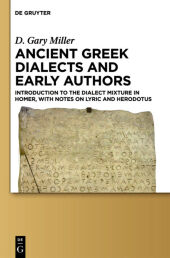 Neuerscheinungen 2013Stand: 2020-01-07 |
Schnellsuche
ISBN/Stichwort/Autor
|
Herderstraße 10
10625 Berlin
Tel.: 030 315 714 16
Fax 030 315 714 14
info@buchspektrum.de |

D. G. Miller
Ancient Greek Dialects and Early Authors
Introduction to the Dialect Mixture in Homer, with Notes on Lyric and Herodotus
2013. XXXIII, 442 S. 230 mm
Verlag/Jahr: DE GRUYTER 2013
ISBN: 1-61451-493-3 (1614514933)
Neue ISBN: 978-1-61451-493-0 (9781614514930)
Preis und Lieferzeit: Bitte klicken
Epic is dialectally mixed but Ionic at its core. The proper dialect for elegy was Ionic, even when composed by Tyrtaeus in Sparta or Theognis in Megara, both Doric areas. Choral lyric poets represent the major dialect areas: Aeolic (Sappho, Alcaeus), Ionic (Anacreon, Archilochus, Simonides), and Doric (Alcman, Ibycus, Stesichorus, Pindar). Most distinctive are the Aeolic poets. The rest may have a preference for their own dialect (some more than others) but in their Lesbian veneer and mixture of Doric and Ionic forms are to some extent dialectally indistinguishable. All of the ancient authors use a literary language that is artificial from the point of view of any individual dialect. Homer has the most forms that occur in no actual dialect. In this volume, by means of dialectally and chronologically arranged illustrative texts, translated and provided with running commentary, some of the early Greek authors are compared against epigraphic records, where available, from the same period and locality in order to provide an appreciation of: the internal history of the Ancient Greek language and its dialects; the evolution of the multilectal, artificial poetic language that characterizes the main genres of the most ancient Greek literature, especially Homer / epic, with notes on choral lyric and even the literary language of the prose historian Herodotus; the formulaic properties of ancient poetry, especially epic genres; the development of more complex meters, colometric structure, and poetic conventions; and the basis for decisions about text editing and the selection of a manuscript alternant or emendation that was plausibly used by a given author.
D. Gary Miller, University of Florida, Gainesville, USA/University of Colorado, Boulder, USA.


